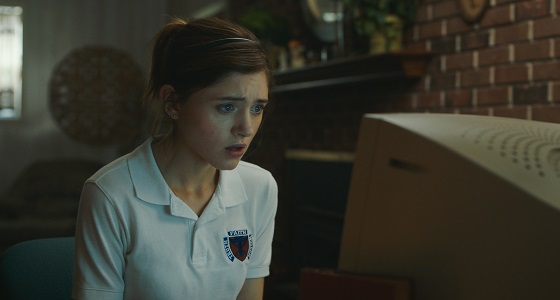

[Rating: Minor Rock Fist Up]
Opening July 24 at virtual cinemas and drive-ins, July 28 on digital and VOD.
Too often, movies that deal with adolescent sexual awakenings work in pairs, using tedious intimate moments and/or some awkward backseat fumblings when in fact, for most, these initial steps are taken solo. Discovering one’s libido is often a private experience that has little company in its earliest stages, making a film that explores this very real phase in its natural alone state long overdue. And that is just what Yes, God, Yes sets out to do, using good ol’ fashioned Midwest Christian fanaticism as a place setting for a story that runs a little thin, yet hits its mark all the same.
In Iowa circa 2001 Alice (Natalia Dyer) is a straight-edge Catholic school Junior who enjoys her status in the middle of her high school’s social pack. Although Alice has begun to explore AOL chat rooms to get a whiff of a sexual universe that she is clueless about, her audacity in this department doesn’t venture beyond multiple rewinds of Kate and Leo’s love scene in Titanic. When a baseless rumor starts circulating around her school that she hooked up with a classmate, Alice is horrified to find out that Catholic guilt is real and can be weaponized as an offensive tool by students and teachers alike.
When a school-organized retreat becomes the “it” event of the year, Alice attends hoping that some of the religious piety associated with the event will rub off and dislodge the rumors plaguing her. Alice is indeed struggling with sexual urges that respond enthusiastically when she puts her hand “down there,” and while she hasn’t acted on these temptations, the persistent rumors that she has and the disgusted attitude of those around her set her emotions ablaze. It’s an interesting set-up with a unique twist, as Alice doesn’t have a partner to commiserate with, or even much of a friend circle to bounce off of, leaving the young woman alone to reconcile shame and confusion from all sides.

Writer/director Karen Maine (Obvious Child) adapted Yes, God, Yes from her short film of the same name, and drew on a Catholic upbringing to color in the blank spaces around the characters and settings. Going through a sexual awakening whilst cloistered in a fanatically religious environment is liable to drive a person underground, which is exactly what happens to Alice, and is just about the worst thing for her. What a young adult needs at this age is sympathy and education, not shame and guilt, and Maine does a marvelous job demonstrating just how confusing and treacherous this stretch of life can be in a virulently religious environment.
While Alice is trying to quell rumors that she did not, in fact, toss her classmate’s salad, she simultaneously is on a quest to learn what it means to do so. Dicey visits to AOL chat rooms to figure out what salad tossing means leads to dirty encounters Alice doesn’t exactly shy away from, fueling more sexual energy she’s not allowed to have, but enjoys all the same because a more chaste route towards sex education doesn’t exist. It’s a vicious cycle, and one that is fed oxygen by a catty, rumor-starved school that devours any trace of sexual deviancy in a social crucifixion scenario that Jesus Himself would recognize.
Dyer is a bit of a stretch for a 16/17 year old at 25, yet is able to convey the mortified babe in the woods moments of sexual epiphany well. When the whole school turns on her after the hookup rumors start circulating, her withdrawal inside of herself is believable and sells well, just as the moments of curious self-discovery do. Dyer is swimming upstream, though, and doesn’t get much help from the supporting cast, who all play broad and with all the subtlety of a community theater on audition night. It puts Dyer on something of an island with little support, except for Timothy Simons as the school’s sex-ed teacher and retreat leader, Father Murphy, who demonstrates a capacity for subterranean nuance few of his costars possess.

Fr. Murphy’s bearing as a strait-laced company man for the Church is betrayed by a hypocrisy that runs like a current through the entire community, yet it is a theme Maine only teases at and never fully explores. This duplicitous insincerity is a running theme throughout the picture, yet Maine never quite connects Alice’s growing awareness of it with the maturation process that serves as the backbone of the narrative. This is a problem the film has as a whole, in that it sets up its characters and their world for the perfect tee-off that never occurs. A conversation late in the movie with an older, wiser ex-Catholic sets Alice off on the right path, yet it’s just one piece of a resolution that never comes to fruition.
At a lean 78 minutes, Yes, God, Yes is dying for a cap to its third act, where lessons learned or an ally previously unknown emerges and sets Alice for a public win earned by her trials in the picture. It never really comes, though, and while the film’s lead does experience growth, it feels like one step short of what the story has earned by the end. Maine should be commended for making a film that takes a stab at the very real alone-ness of sexual discovery, but at a certain point, most characters need a push, or at the very least a victory in company once everything is said and done.
That said, Yes, God, Yes is a decent flick that takes a run at a very real, albeit uncinematic, moment in every person’s life. Carried by Dyer, who proves she can do just about anything in the teenage market, even in her mid-20s, the film is a pleasant slice of adolescent life amidst the rabid Christian hordes. Although it doesn’t deserve the adamant attention the titles suggests, one could do worse than saying “yes” to Yes, God, Yes.





Comments on this entry are closed.